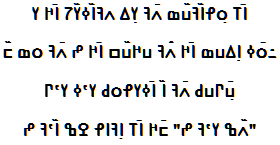Dyula love poem
ߘߎ߬ߓߊ߬ߟߋ߲
ߌ ߞߊ߫ ߖߌ߬ߦߊ߬ߓߍ ߡߌ߲ ߓߍ߫ ߘߎ߬ߓߊ߬ߟߋ߲ ߠߊ߫
ߏ߬ ߘߋ ߓߍ߫ ߒ ߞߊ߫ ߛߎ߬ߞߎ ߓߍ߯ ߞߊ߫ ߘߎߡߊ߲ ߦߋ߫߸
ߣߴߌ ߦߴߌ ߕߋߟߌߦߊ߫ ߊ߬ ߓߍ߫ ߕߎߣߎ߲߫
ߒ ߓߴߊ߬ ߝߐ ߟߊߓߊ߲ ߠߊ߫ ߞߏ߫ "ߒ ߓߴߌ ߝߍ߬"

Romanization
Dùbàlén
í ká jìyàbɛ́` mín` bɛ́ dùbàlén` ná
ò dé` bɛ́ Ń ká sùkú` bɛ́ɛ ká dúmán` yé,
n'í y'í télíyá à bɛ́ túnún
Ń b'à fɔ́` lábán` ná kó "Ń b'í fɛ̀"

→ French poem ←
Jula language & Ivory coast
Jula love poem (Dyula, Tagboussikan, Kong Jula, Djula, Diula, Trade Jula, Dyoula, Dioula, Jula Kong), from Ivory Coast, in n'ko alphabet, the transcription script of the mande languages of west africa. My Jula poem, as this vehicular Mandingo language that has spread with the merchants in different countries, will also travel in Africa, I am sure as much that the African girl that I saw in my dream is pretty. This Niger-Congolese language of Ivory Coast and Burkina Faso, especially, but also of Mali, Ghana and Guinea has 21 million speakers.
Ivory Coast is a country with a young population spread unevenly on its territory, the southwest is almost empty and the Abidjan region is very densely populated.
There are more than 60 ethnic groups divided into 4 major groups: the Krou group in the S.O., the mande group to the N.O, the voltaic group in the N.E, and the Akan group in the southern quarter. This diversity is accentuated by the presence of foreign populations. It is a rich country with, coffee, cocoa, palm, pineapple, wood, fishing and oil.
Mandes & mande languages
There are 30 mande languages, most of them spoken in Guinea, Mali, Senegal, Sierra Leone, Liberia and Ivory Coast. It is believed that the Mandés originally lived in a more humid Saharan region and practiced fishing and farming.
4,000 years ago their language was common. Around -1,000 because of climate change and the drying up of their region of origin, some to survive, will go further south in search of a less dry climate, creating with them what will be called the proto-mande, the others will intensify their cultures. they will form the western branch.
With shifts to the west, the Sonninkés will migrate to the north. The trans-Saharan trade which made them exchange their gold (delta of Niger) against salt and Mediterranean products, will give birth to the Sonninkes empires of Ghana, and to the Mande empire of Mali, until the middle of the 16th century. Its importance will extend the importance of the Mande language.
The entry of these populations into the equatorial forest is thought to date from the 15th century. With the Portuguese slavery will develop, trade too, but at the expense of the one with the north ... It will be the decline of the Sudanese empire.